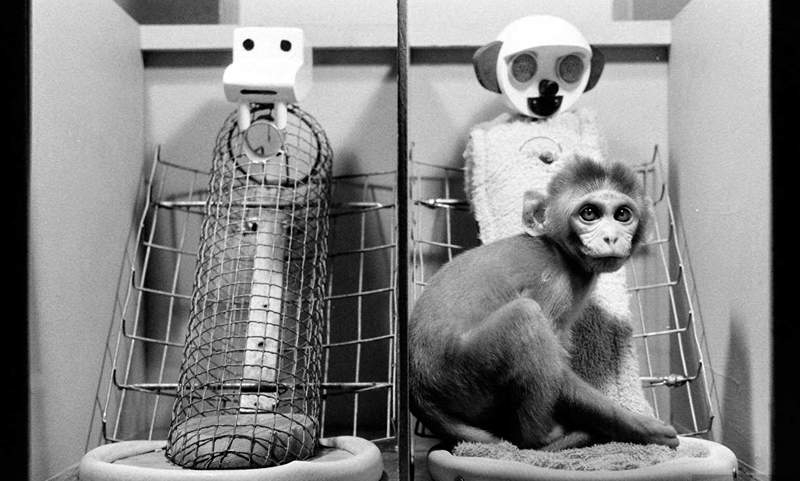Harlow's experiment and maternal deprivation

- 851
- 192
- Herbert Ritchie
Harlow's experiment and maternal deprivation caused a lot.
The psychologist Harry Harlow wanted to bring to a laboratory the theory about the attachment and maternal deprivation developed by John Bowlby.
After World War II, there were many children who were orphaned and who wandered around the cities, without any destination.
Thus, there were many people who lived in sewers or basements, without the protection of a father or a mother.
This scenario was perfect for psychoanalyst and psychiatrist Bowlby to develop his theory about maternal deprivation and attachment.
For Bowlby, Newborns need to develop a relationship with a caregiver, In order to have normal social and emotional development.
Thus, maternal affection was estimated as an indispensable condition that infants needed.
But, Harry Harlow wanted to check it in a laboratory.
It was in this way that Harlow's experiment with monkeys Rhesus began, newborns, which were separated from their mothers.
Harlow's experiment, cruel and controversial
Harlow's experiment was still cruel or controversial, then, taking into consideration that monkeys have a similar learning to be human beings, Harlow wanted to make their observations with this species.
So, in 1932 he designed a Rhesus MacaCos neighborhood in which he analyzed their development as time went by.
The purpose of his study was to expose the monkeys in different contexts of affection during their development, and then analyze their behaviors and their adaptation process.
What Harlow verified was that, The small monkeys who had been raised without their mothers, formed an attachment link with any type of object, Like a rag, for example.
That is, the monkeys seemed to have a psychic and biological dependency need.
According to researcher Suomi, Sthepen and Harry Harlow, in their study on early experiences and psychopathology induced in Rhesus monkeys, the greater restriction in the early social environment, there was a greater deficiency in the repertoire of the social behavior of the monkey of the monkey of the monkey.
This means that raising in isolation produced permanent and irreversible consequences in social behavior.
Observations in Harlow's experiment
Even when basic needs, such as cleaning and food, were covered, the monkeys expressed discomfort when they were removed the object they had attached.
Therefore, in a cage, they were placed a wire mother who provided them with food in a bottle.
Also, an artificial mother made with a plush, which had no food, placed them in the cage.
The first thing to notice was that The monkeys were with the wire mother just to eat, but the rest of the time were with the Mother, Which made believe that the monkeys found the medium in the mother's mother to obtain protection, care and affection.
Another impressive detail was that, when threatening stimuli were introduced in the cage, the monkeys went with the plush's mother to find care.
Likewise, it was observed that a group of monkeys that had been taken from the cage where they had grown up, when they returned them, they ran towards the Mother of Pelpa, thereby denoting affection.
All these observations allowed to conclude that For the monkeys, the mother who cared for them was more important and not the one that only fed them.
But, this experiment went further. Some monkeys were raised in cages in which there was no mother's, real or artificial type.
The most striking thing about this experiment was that, when these monkeys that were raised alone.
Since then, this Harlow experiment has become a reference to try to explain the impact of the absence of the maternal figure on childhood and the possibility that individuals, in adult ages, develop maladaptive behaviors.
The importance of the feeling of belonging
Bibliography
- Of the theory, p. Yo. H. 2. Attachment precursors: Spitz, Lorenz and Harlow. 55.
- Lewin, k. (1935). Field theory. A dynamic personality theory. Editorial McGraw Hill. NY.
- Suomi, s. J., & Harlow, H. F. (1975). Early experiences and induced psychopathology in monkeys rhesus. Latin American Magazine of Psychology, 7(2), 205-229.
- Vast, r. (2009). Child psychology. Barcelona: Ariel, 2001 ..

